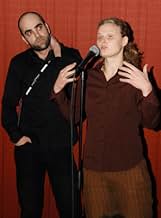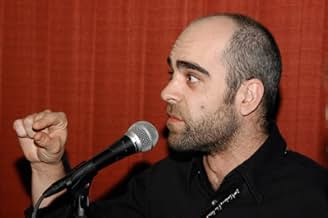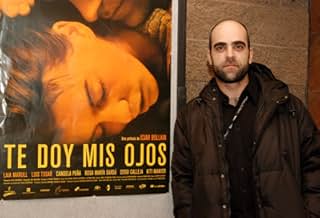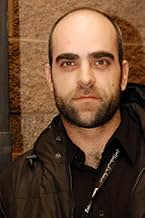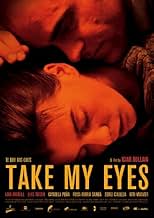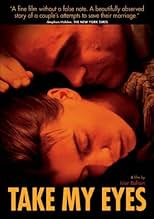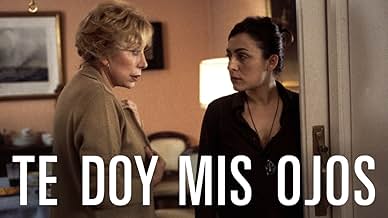VALUTAZIONE IMDb
7,4/10
7763
LA TUA VALUTAZIONE
Aggiungi una trama nella tua linguaOne winter night, Pilar runs away from home. With her, she takes only a few belongings and her son, Juan. Antonio soon sets out to look for her. He says Pilar is his sunshine, and what's mor... Leggi tuttoOne winter night, Pilar runs away from home. With her, she takes only a few belongings and her son, Juan. Antonio soon sets out to look for her. He says Pilar is his sunshine, and what's more, "She gave him her eyes"...One winter night, Pilar runs away from home. With her, she takes only a few belongings and her son, Juan. Antonio soon sets out to look for her. He says Pilar is his sunshine, and what's more, "She gave him her eyes"...
- Premi
- 42 vittorie e 17 candidature totali
Rosa Maria Sardà
- Aurora
- (as Rosa María Sardá)
Kiti Mánver
- Rosa
- (as Kiti Manver)
David Mooney
- John
- (as Dave Mooney)
Recensioni in evidenza
This movie takes a brutally honest approach at the tragic reality of spousal abuse. This topic has been addressed before, but this movie deals with the subject matter better than any other I can recall seeing.
An effective performance by Luis Tosar, as the abusive husband Antonio, develops the layers of emotions in this imposing and frightening character in an effort to understand why this violence is occurring. While certainly not presenting an advocate's position to defend his cruel and vicious behavior, the film also resists the temptation of exploiting the volatile outbreaks. The film shows degrading speech and physical battery to the wife, while not going overboard with bloody, gory attack just for their own sake. He attends support groups to discuss with a psychologist and other abusers the root causes of the action, and makes a sincere effort to change his ways. Gradually, the motivations for his irrational action, although becoming clearly understood, are still properly advanced as totally unacceptable.
Laia Marull, as the abused wife, is not stereotyped, either. She is shown as an intelligent and capable person, making an honest effort to confront the situation, while struggling with the conflict of somehow preserving the marriage. There are many artistic metaphors about the passion of their marriage reflecting the very problem they are dealing with. I also like the wife's museum tour presentations, where she is clearly talking not only of the paintings, but of her own aspirations. Both of the principals are splendid in their roles, especially in their interaction with one another.
Much could be written of the rich double-layered symbolism of several other scenes. Suffice it to say this is a beautifully done movie with an ending, that in all its simplicity, took me by surprise. It was the proper ending, too, I think, for reasons you will understand when you see the movie. Definitely worth viewing.
An effective performance by Luis Tosar, as the abusive husband Antonio, develops the layers of emotions in this imposing and frightening character in an effort to understand why this violence is occurring. While certainly not presenting an advocate's position to defend his cruel and vicious behavior, the film also resists the temptation of exploiting the volatile outbreaks. The film shows degrading speech and physical battery to the wife, while not going overboard with bloody, gory attack just for their own sake. He attends support groups to discuss with a psychologist and other abusers the root causes of the action, and makes a sincere effort to change his ways. Gradually, the motivations for his irrational action, although becoming clearly understood, are still properly advanced as totally unacceptable.
Laia Marull, as the abused wife, is not stereotyped, either. She is shown as an intelligent and capable person, making an honest effort to confront the situation, while struggling with the conflict of somehow preserving the marriage. There are many artistic metaphors about the passion of their marriage reflecting the very problem they are dealing with. I also like the wife's museum tour presentations, where she is clearly talking not only of the paintings, but of her own aspirations. Both of the principals are splendid in their roles, especially in their interaction with one another.
Much could be written of the rich double-layered symbolism of several other scenes. Suffice it to say this is a beautifully done movie with an ending, that in all its simplicity, took me by surprise. It was the proper ending, too, I think, for reasons you will understand when you see the movie. Definitely worth viewing.
8Nzup
There are for sure many other films dealing with domestic violence, but I bet no one is better than this one.
This is something that is said to happen quite often in Spain and the movie was shot in order to sensitize people for this issue and to bring to talk about it. It is the story of an ill jealous man, full of complex of inferiority, terrorizing his wife and son.
I loved the love scene between both, where he makes her repeat that she gives all her body to him (Te doy mis ojos, te doy mi boca etc.). It shows perfectly the mental state of the husband who sees his wife as his property.
This was as well an excellent performance of Laia Marull and Luis Tosar.
This is something that is said to happen quite often in Spain and the movie was shot in order to sensitize people for this issue and to bring to talk about it. It is the story of an ill jealous man, full of complex of inferiority, terrorizing his wife and son.
I loved the love scene between both, where he makes her repeat that she gives all her body to him (Te doy mis ojos, te doy mi boca etc.). It shows perfectly the mental state of the husband who sees his wife as his property.
This was as well an excellent performance of Laia Marull and Luis Tosar.
"Take My Eyes (Te doy mis ojos)" is a frank, classy woman in jeopardy/Lifetime TV for Women film.
A couple of elements raise it above Hollywood's unfortunately already tired treatment of abused wives in such films as "Sleeping with the Enemy" or "Enough", among many others.
First is the superb acting by Laia Marull as "Pilar". Her transformation from frightened mouse to tentative independent to an expressive person with a back bone is riveting. She does look distractingly like Annabella Sciorra, but that means she is beautiful and very womanly.
Second is the emphasis less on the physical violence by an abuser that American films revel in (this film opens right after such an incident) than on the psychological impact, both on abuser and victim. Even amidst strife, this is a passionate couple who were very much in love, though we get hints from the beginning that he was controlling, as in the conversations that include the titular phrase. Unlike Hollywood, her final revenge is not violent but in how she uses those words back at him.
Uniquely, we see the husband (Luis Tosar as "Antonio" looking distractingly like the Irish actor James Nesbitt) as a 360 degree person, with his own family stresses, and not just as the usual evil incarnate. Though we don't see how he got into anger-management therapy sessions for abusers that in the U.S. are usually only a result of a court-order and I couldn't tell from the untranslated credits what experts were consulted for these recreations, they are a fascinating look at an attempt to change abusive behaviors. The shrink finds he has to teach these guys even how to have a conversation with their wives to prevent triggers, let alone what to do when rage starts filling their heads.
Another difference is that while the husband jealously fixates on the possibility of her finding a new lover, a sensitive new age guy character invariably appears in the Hollywood versions (and it was entertainingly non-stereotypical that the Scottish brother-in-law is held up as a prized alternative), the threat to his marriage actually comes from her relationships with the women in her life, from family to friends. Through them she becomes more attuned to humiliation as violence than even her hospital records filled with lied about fractures. It was a bit much symbolically to have her suddenly get into artistic presentations of ancient sexy myths, though it was nice that the credits identified each of the paintings discussed.
While sadly this is a familiar story in filmed outline, the film is continually suspenseful and involving as to what they will do, together and apart.
A couple of elements raise it above Hollywood's unfortunately already tired treatment of abused wives in such films as "Sleeping with the Enemy" or "Enough", among many others.
First is the superb acting by Laia Marull as "Pilar". Her transformation from frightened mouse to tentative independent to an expressive person with a back bone is riveting. She does look distractingly like Annabella Sciorra, but that means she is beautiful and very womanly.
Second is the emphasis less on the physical violence by an abuser that American films revel in (this film opens right after such an incident) than on the psychological impact, both on abuser and victim. Even amidst strife, this is a passionate couple who were very much in love, though we get hints from the beginning that he was controlling, as in the conversations that include the titular phrase. Unlike Hollywood, her final revenge is not violent but in how she uses those words back at him.
Uniquely, we see the husband (Luis Tosar as "Antonio" looking distractingly like the Irish actor James Nesbitt) as a 360 degree person, with his own family stresses, and not just as the usual evil incarnate. Though we don't see how he got into anger-management therapy sessions for abusers that in the U.S. are usually only a result of a court-order and I couldn't tell from the untranslated credits what experts were consulted for these recreations, they are a fascinating look at an attempt to change abusive behaviors. The shrink finds he has to teach these guys even how to have a conversation with their wives to prevent triggers, let alone what to do when rage starts filling their heads.
Another difference is that while the husband jealously fixates on the possibility of her finding a new lover, a sensitive new age guy character invariably appears in the Hollywood versions (and it was entertainingly non-stereotypical that the Scottish brother-in-law is held up as a prized alternative), the threat to his marriage actually comes from her relationships with the women in her life, from family to friends. Through them she becomes more attuned to humiliation as violence than even her hospital records filled with lied about fractures. It was a bit much symbolically to have her suddenly get into artistic presentations of ancient sexy myths, though it was nice that the credits identified each of the paintings discussed.
While sadly this is a familiar story in filmed outline, the film is continually suspenseful and involving as to what they will do, together and apart.
Writer-director Iciar Bollaín's film, TAKE MY EYES (Spain 2003) is full of boldness and nuance, approaching 'full frontal' (almost a pun here) the delicate 'taboo' subject on spouse abuse in love and marriage. The exceptionally talented and selfless portrayal of the couple by Laia Marull as Pilar (the young wife/mother) and Luis Tosa as Antonio (the husband/abuser) made their scenes together - both the tender moments and violent events, convincing and complete. It's heartbreaking to see these two people who could be so in love (felt through the intimate lovemaking scenes, the calm moments they enjoy each other by the river) yet juxtaposed by the traumatic turn of events (seen through the 'explosive' frightful situations). Bollaín, with Marull and Tosa, did not shy away from the volatile subject and key scenes - it is no doubt devastating to behold yet the impact of the situation is truly felt and may also leave us shaking. Kudos to such giving and fearless performances and production decisions.
The Toledo, Spain, locales (especially by the river and bridge) seen in the film are as beautiful as I visited in Fall 2003. I remember the museum where Antonio waited outside for Pilar. He tried. He wanted to be a loving husband to her, but he couldn't help himself. It almost seem like uncontrollable 'alcoholic dependency', his jealous rage generated from fear of losing Pilar, whom he believes he loves in his own possessive ways. While Pilar also tries. She practically loses herself in trying to please Antonio and be 'blinded' by his waves of tenderness towards her. She's struggling to be a good wife and responsible mother to their little boy. She's also trying to find herself through the process.
I recall the wisdom from poet Kahlil Gibran's book "The Prophet" on Marriage: yes, you shall be together forever more, but there should be spaces in your togetherness. "Give your hearts, but not into each other's keeping. For only the hand of Life can contain your hearts." And on Love, that it does not possesses, Gibran said: "And think not you can direct the course of love, for love, if it finds you worthy, directs your course."
TAKE MY EYES gives us a rare chance to observe closely the various aspects/perspectives of a domestic violence situation, and offering viable option on the part of the woman. It may not be an easy film to watch due to frank emotional depiction, but it is superbly delivered by a fantastic cast besides Marull and Tosa. The script, co-written by Bollaín and Alicia Luna, contains supporting storyline (including a wedding and Scottish bagpipes and kilts - cultural diversity, girl talk, men talk, laughs and heartaches). Production is excellent in every respect: cinematography, editing, art direction, music score, sound and all. Highly recommend this film, with no hesitation.
The Toledo, Spain, locales (especially by the river and bridge) seen in the film are as beautiful as I visited in Fall 2003. I remember the museum where Antonio waited outside for Pilar. He tried. He wanted to be a loving husband to her, but he couldn't help himself. It almost seem like uncontrollable 'alcoholic dependency', his jealous rage generated from fear of losing Pilar, whom he believes he loves in his own possessive ways. While Pilar also tries. She practically loses herself in trying to please Antonio and be 'blinded' by his waves of tenderness towards her. She's struggling to be a good wife and responsible mother to their little boy. She's also trying to find herself through the process.
I recall the wisdom from poet Kahlil Gibran's book "The Prophet" on Marriage: yes, you shall be together forever more, but there should be spaces in your togetherness. "Give your hearts, but not into each other's keeping. For only the hand of Life can contain your hearts." And on Love, that it does not possesses, Gibran said: "And think not you can direct the course of love, for love, if it finds you worthy, directs your course."
TAKE MY EYES gives us a rare chance to observe closely the various aspects/perspectives of a domestic violence situation, and offering viable option on the part of the woman. It may not be an easy film to watch due to frank emotional depiction, but it is superbly delivered by a fantastic cast besides Marull and Tosa. The script, co-written by Bollaín and Alicia Luna, contains supporting storyline (including a wedding and Scottish bagpipes and kilts - cultural diversity, girl talk, men talk, laughs and heartaches). Production is excellent in every respect: cinematography, editing, art direction, music score, sound and all. Highly recommend this film, with no hesitation.
This is an excellent movie that understands the complexity of domestic violence. I am an advocate for survivors of domestic violence and we know that partner abuse is much more than a black eye. During the movie there is only one episode of physical violence, however we can observe throughout the movie the dynamics of power and control by the husband, through emotional, verbal, and other types of abuse. The person who wrote the previous message shows a complete lack of understanding about the impact that domestic violence has on the victim, why it is so difficult to break with cycle, the challenges that women face when they try to leave (including the fear of retaliation). Don't forget that 75% of women killed by their partners were murdered after they left the relationship. By leaving, women are taking a great risk. I think this movie is very realistic and the actors do a great job. I highly recommend it.
Lo sapevi?
- QuizLaia Marull said her role in this film is the one that has marked her career the most. "It was a very intense movie. I remember the scene in which my character is undressed by his partner and urinates on the balcony. It was a very emotional scene. Working with Luis Tosar is very easy because you look into his eyes and he gives you everything," Marull said. For his part, Tosar revealed a secret about that scene: "When we filmed the scene on the balcony, in which she pees on herself out of fear, I remember being with a sponge between her legs, helping her squeeze it so that the trickle would fall out."
- ConnessioniReferenced in Spanish Movie (2009)
- Colonne sonoreFarewell To Gibraltar
Canción popular escocesa
I più visti
Accedi per valutare e creare un elenco di titoli salvati per ottenere consigli personalizzati
- How long is Take My Eyes?Powered by Alexa
Dettagli
- Data di uscita
- Paese di origine
- Sito ufficiale
- Lingua
- Celebre anche come
- Take My Eyes
- Luoghi delle riprese
- Aziende produttrici
- Vedi altri crediti dell’azienda su IMDbPro
Botteghino
- Lordo Stati Uniti e Canada
- 30.496 USD
- Fine settimana di apertura Stati Uniti e Canada
- 6440 USD
- 19 mar 2006
- Lordo in tutto il mondo
- 6.098.633 USD
- Tempo di esecuzione
- 1h 49min(109 min)
- Colore
- Mix di suoni
- Proporzioni
- 1.85 : 1
Contribuisci a questa pagina
Suggerisci una modifica o aggiungi i contenuti mancanti

![Tráiler [OVS]](https://m.media-amazon.com/images/M/MV5BNDFiNzRhYTMtODVmNy00OWQ0LTkwMzAtYjRiNGZmNTk4YjhhXkEyXkFqcGdeQXRyYW5zY29kZS13b3JrZmxvdw@@._V1_QL75_UX500_CR0)
